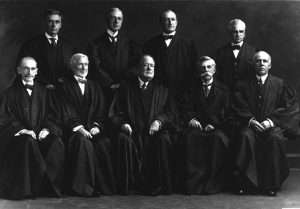The Volokh Conspiracy
Mostly law professors | Sometimes contrarian | Often libertarian | Always independent
Today in Supreme Court History: October 21, 1919
10/21/1919: Abrams v. United States argued.

Editor's Note: We invite comments and request that they be civil and on-topic. We do not moderate or assume any responsibility for comments, which are owned by the readers who post them. Comments do not represent the views of Reason.com or Reason Foundation. We reserve the right to delete any comment for any reason at any time. Comments may only be edited within 5 minutes of posting. Report abuses.
Please to post comments


Mireles v. Waco, 502 U.S. 9 (decided October 21, 1991): judicial immunity for judge who ordered public defender seized and brought into courtroom when he failed to appear for a calendar call; ordering use of (allegedly excessive) force was acting in aid of his judicial authority (see law review article detailing what happened, https://core.ac.uk/download/ pdf/232781112.pdf, doesn’t make the judge look good)
United States v. Michigan Nat’l Corp., 419 U.S. 1 (decided October 21, 1974): Government can bring antitrust suit against holding company creating “phantom” banks into which real bank assets would be merged, even though Comptroller of the Currency had yet to approve the merger; Federal Reserve Board (the other necessary approver) had already approved it (!!), creating a case or controversy, and under statute the Gov’t had only 30 days to sue
Tipton v. Socony Mobil Oil Co., 375 U.S. 34 (decided October 21, 1963): evidence that plaintiff had received longshoreman’s benefits so as to prove that he was not a sailor (as required for his Jones Act personal injury suit) should not have been placed before the jury without a cautionary instruction as to narrow issue it was admitted for and instruction that it was not dispositive on that issue (Jones Act has since been amended allowing non-sailors to sue; I defended one such case)
The company would have got away with it if it wasn't for those meddling kids.
In United States v. Michigan Nat’l Corp, I like the Court’s resolution.
“Congress does not appear to have considered expressly the application of the time limitations to transactions falling within both regulatory statutes. [4] While the question is not free from doubt, there is a procedure that preserves beyond doubt the Government’s ability fully to pursue its Clayton Act suit and at the same time produces no hardship to the other party. [5] Where suit is brought after the first administrative decision and stayed until remaining administrative proceedings have concluded, judicial resources are conserved and both parties fully protected.
The judgment of the District Court is vacated and the case remanded for the entry of further orders consistent with this opinion.”
The District Court should stay the govt’s suit not simply dismiss it.
Could be worse, look what happened to sketchy banks in the mid east yesterday.
Abrams is one of the cases covered in the well-written Free Speech Handbook by Ian Rosenberg and Mike Cavallaro (art), a graphic account of ten cases.
https://www.freespeechhandbook.com/
One interesting tidbit is what happened to the defendants in the case. For instance, Mollie Steimer eventually had her sentence commuted if she agreed (along with her co-defendants) to leave the country. To be blunt, deported.
Russia was not a safe harbor either and she was deported to Germany. She had more travels, got caught up in WWII, escaped, and eventually wound up in Mexico.
She died there in 1980.
https://en.wikipedia.org/wiki/Mollie_Steimer
You can have originalism or modern free speech doctrine, not both. Pick your poison.
I'll choose secret option (c) - free speech per 9A.
How living constitutionalist of you. And a good thing, too, because almost nobody back when, either in the states that had bills of rights or on the federal bench, had notions of free speech anything like what we take for granted today.
I’m unsure how much “free speech per 9A” would change the choice.
Modern free speech law is arguably based on early precedent, just not *judicial* precedent.
Congress voted to refund the fines of two victims of the Sedition Act.
Holmes deemed this significant in his dissent: "I wholly disagree with the argument of the Government that the First Amendment left the common law as to seditious libel in force. History seems to me against the notion. I had conceived that the United States, through many years, had shown its repentance for the Sedition Act of 1798, by repaying fines that it imposed."